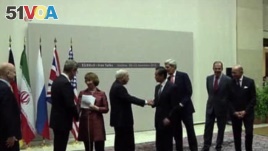December 17,2013
LONDON — The year 2013 saw major changes for Iran, with the election of a more moderate president and agreement with the international community to limit its nuclear program. But experts say the real test for the extent of the changes will come in 2014, when Iran will be called on to make additional, more permanent, policy changes.
It was a remarkable moment in November when the Iranian foreign minister and his counterparts from six world powers reached a preliminary agreement to limit Iran’s nuclear program and to ease economic sanctions.
It capped a year of dramatic change in Iran.

Just a year ago, then President Mahmoud Ahmedinejad was still engaging in his harsh rhetoric against the West and refusing to hold substantive talks on the nuclear program, as mismanagement and economic sanctions crippled Iran’s economy.
Then, in June, Iranian voters elected a relative moderate, Hassan Rouhani, to replace him. And just as significantly, Iran’s Supreme Leader, the Ayatollah Ali Khamenei, publicly backed Rouhani's new approach.
All that culminated in the nuclear accord in Geneva in November.
“Well, I do see it as a dramatic difference, but I caution that we shouldn’t over-estimate what’s going on,” said retired U.S. diplomat Richard LeBaron, now at the Atlantic Council. "I think 2014 will be the key year in determining whether Iran is on a strategic change of course. But so far, I think it’s a tactical move.”
LeBaron predicts a resumption of the internal struggle between hardliners and moderates, as Iran is called on to make more concessions to reach a long-term nuclear accord.
At London’s International Institute for Strategic Studies, Mark Fitzpatrick says the coming months will focus on negotiations, not talk of war.
“If Iran’s nuclear program had not been at least capped, it was making progress that would have crossed Israel’s red lines, I think, by next summer, and we very well could have had a military option being exercised,” Fitzpatrick said.
Fitzpatrick and LeBaron both doubt Iranian leaders’ assurances that they have no interest in building a nuclear weapon. The experts say officials likely want to maintain the option for the future, while also getting sanctions eased to satisfy their people.
Fitzpatrick says it’s a question of how many restrictions Iran will accept, and how long it would take to develop a weapons if it decides to do so. “Will they accept as long of a lead time as the United States would want, in order to feel comfortable? That’s going to be the tricky part in the discussions that are upcoming.”
Those talks have a six-month deadline that many experts say will be difficult to meet. Even incremental progress could ease concerns in the Middle East and in the West and might even open the possibility of cooperation on other issues, particularly Syria. But deadlock would likely recreate the tensions of recent years.